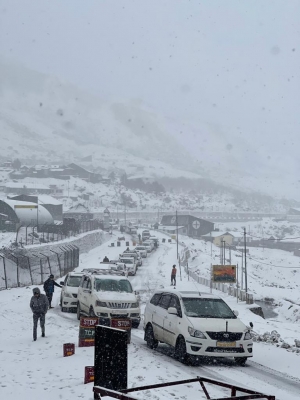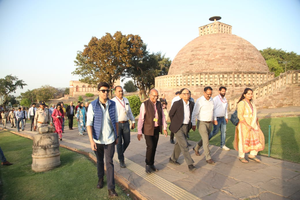
Chennai, April 10 (IANS) The Coimbatore City Municipal Corporation (CCMC), in collaboration with the district administration in Tamil Nadu, has launched an aggressive campaign to enhance rainwater harvesting (RWH) across the city.
With summer heat touching 38.5 degrees to 39 degrees Celsius in many districts of Western Tamil Nadu like Erode, Salem and Coimbatore, the city corporation has stepped up rain harvesting initiatives
The latest initiative is part of a broader effort of the Tamil Nadu government to address water scarcity and improve groundwater recharge. As a key step, the CCMC has already installed rainwater harvesting systems in government buildings, private institutions, residential complexes, vacant plots, and commercial establishments. However, several of these systems have fallen into disrepair or are not being properly maintained.
To address this, the corporation has called for urgent repairs and the restoration of faulty RWH structures to ensure effective rainwater collection and improved groundwater levels.
In a bid to expand the state government’s rainwater harvesting scheme, the district administration and CCMC have jointly introduced a mobile app-based survey. This platform allows officials — working alongside NGOs and volunteers — to conduct field inspections of residential, commercial, and government properties to assess the current status of RWH systems.
Based on their findings, they will recommend necessary repairs or the installation of new systems.
The CCMC is also organising special awareness camps at each of its five zonal offices. These camps aim to educate the public and business owners about the benefits and methods of rainwater harvesting.
In addition, the corporation has launched helpline numbers where citizens can seek guidance, share ideas, or raise queries regarding the construction, repair, and maintenance of RWH systems.
Rainwater harvesting involves collecting and storing rainwater during the monsoon season for use during times of scarcity. It is a vital process for conserving water and enhancing groundwater levels, particularly in the face of climate change, population growth, and declining water availability.
Stored rainwater can be used directly or to recharge aquifers, thereby improving both the quantity and quality of groundwater.
In coastal areas, better groundwater recharge also helps balance salinity levels.
The state government made RWH structures mandatory for all buildings through the Tamil Nadu Municipal Laws Ordinance, 2003. The regulation applies to residential, commercial, and industrial buildings. Building plans are only approved if they include RWH systems.
Historically, Tamil Nadu has a rich tradition of rainwater harvesting through structures like tanks and other traditional storage systems. Today, modern methods such as rooftop harvesting and recharge wells are helping carry this legacy forward.
With continued public participation and effective implementation, Coimbatore’s efforts could serve as a model for sustainable urban water, officials said.
–IANS
aal/dpb






